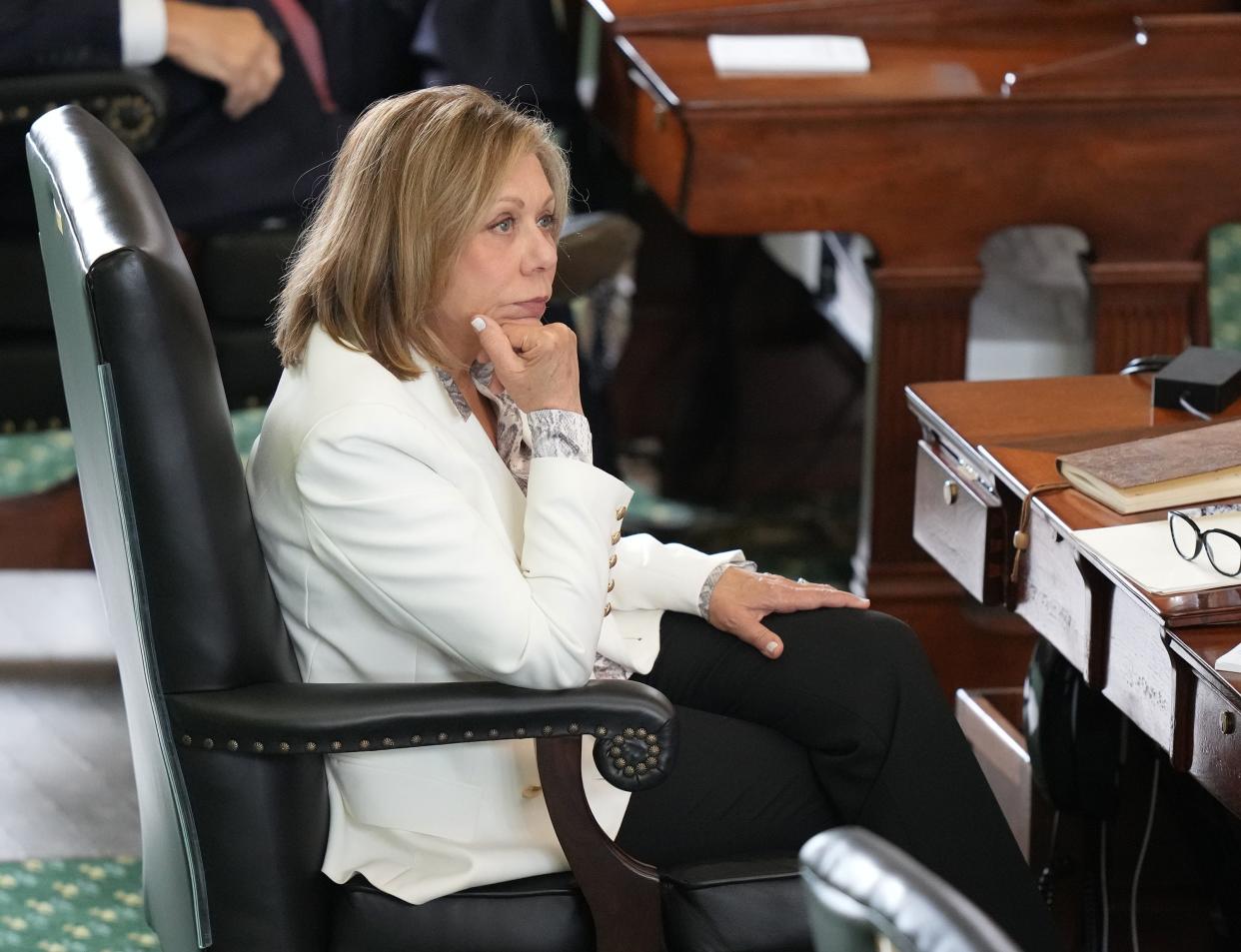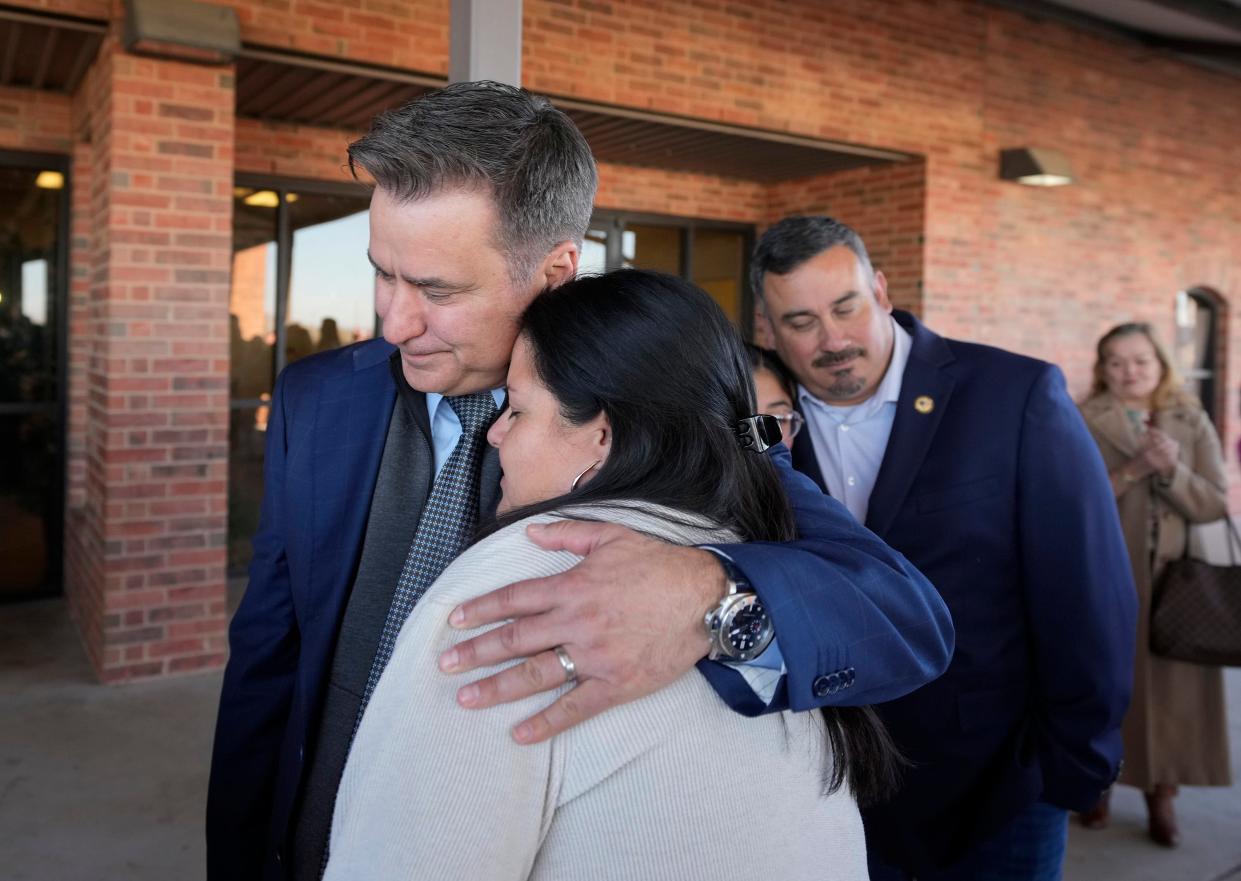Uvalde families fought for gun safety reforms. Here's what the Texas Legislature did.
After 19 children and two adults were killed at Robb Elementary School in Uvalde on May 24, 2022, in what became Texas' deadliest school mass shooting, the grieving families joined together in pushing for gun safety reforms at the Legislature.
Over protests, news conferences, legislative hearings and outbursts in Capitol hallways, the parents and families of those who were gunned down have pleaded with lawmakers over the past two years to make legislative changes to help prevent gun violence.
However, on the second anniversary of the shooting, many of their requested policy initiatives remain unfulfilled and any forward movement is unlikely in the Republican-controlled state government.
More: The Uvalde school shooting thrust them into the national spotlight. Where are they now?
Projects to build a mental health facility in Uvalde and to further fund school safety infrastructure are underway, but the families' marquee efforts to raise the legal age to purchase an assault-style weapon from 18 to 21 and to hold law enforcement accountable for its botched response to the shooting have gained limited traction.
Here's what has resulted of Uvalde residents' calls for stricter gun control measures during the 2023 legislative session:

Hope in a Texas House hearing
In a brief glimmer of hope for the shooting victims' families, a proposed bill to increase the age limit to purchase an assault style weapon overcame partisan odds and advanced successfully from a committee to the House floor last May.
The biggest gun safety measure to be considered by the Legislature in the shooting's aftermath, House Bill 2744 would have raised the minimum age limit to purchase AR-15-style, semi-automatic rifles from 18 to 21.
Advocating for the legislation was a weekslong effort rather than a single event, as families made their way from Uvalde to the Capitol weekly to advocate the measure and push lawmakers into taking action over the course of lengthy, hourslong hearings.
“As we've waited more than 13 hours (to testify), I'm reminded of May 24, 2022, when we waited hours to be told our daughter would never come home,” Kimberly Rubio, whose daughter Lexi was killed in the shooting, said during a hearing last April. “I expressed confusion then, and I'm perplexed now. Did you think we would go home?”
The Robb Elementary gunman legally purchased his weapon just days after his 18th birthday after having unsuccessfully tried to acquire one before he was legally old enough to do so.

With two Republicans voting with the panel's Democratic members, the House Select Committee on Community Safety by an 8-5 vote forwarded the bill for further consideration to the full House, which would be the only time the proposal was considered on the record.
More: See memorials in Uvalde and across Texas that honor victims of Robb Elementary shooting
"I'm overwhelmed with gratitude and happiness, and I'm so glad. It's a huge emotional victory for my constituents and those families,” said Rep. Tracy King, D-Uvalde, holding back tears after the committee advanced the bill.
That victory, however, proved to be short-lived as the bill languished in the House, failing to get a hearing before legislative deadlines cut off its chance to be considered.
'I wanted this bill to make a difference'
The first bill to pass from either chamber last year, Senate Bill 728 brought Texas in line with federal background check standards for potential juvenile gun buyers.
While procedural in nature and not the policy shift families from Uvalde hoped would come during the legislative session, SB 728 by Sen. Joan Huffman, R-Houston, enhanced the process of reviewing juvenile mental health records, centralizing information on the cases of those aged 16 or older who were found to be unfit to proceed with a gun purchase based on certain mental health criteria.
Mirroring and complying with the 2022 federal Bipartisan Safer Communities Act, in Texas, anyone who has been "found not responsible, receiving court-ordered mental health services, or admitted to a residential care facility due to intellectual disability or mental illness in a delinquency proceeding" would be barred from purchasing a firearm.

In passing the legislation out of the conservative Texas Senate, Huffman walked the fine political line Texas lawmakers must toe in addressing gun safety reforms, as Democrats typically jockey to tack on additional safety measures while Republicans seek assurances that such laws will not impede the rights of gun owners.
"We can have good ideas, but if we can't get it passed, then it's not going to make a difference," Huffman said, politely pushing against Democratic offerings to the bill last March. "So I wanted this bill to make a difference."
Despite supporting the policy, Sen. Roland Gutierrez, D-San Antonio, whose district includes Uvalde, said the change to better analyze existing mental health records neglects limiting purchases by those who do not have a mental health history, such as the Uvalde gunman.
"So, first off, I applaud you on this, but this is not foolproof, really nothing is, is it?" Gutierrez said, prior to the bill passing with broad support in both chambers and taking effect in September.

Similarly, Dru Stevenson, a South Texas College of Law in Houston law professor with a focus on gun policy, said that while the change is a positive incremental adjustment, failures to report records and Texas' aversion to complying with federal practices remain issues.
"Because of our society's concerns about privacy for medical records, a lot of those names never get submitted," Stevenson told the Statesman on Thursday. "And so it's a big breakdown in our background check system."
More: Uvalde Police Department's Facebook page says it 'does not allow comments.' Is it legal?
Previously, a legislative look at background checks for gun purchases came up in 2019, in the aftermath of a Midland-Odessa shooting rampage. Lt. Gov. Dan Patrick, who presides over the Senate, railed against the lack of background checks in private gun sales.
However, nothing came of the issue as legislation filed to address private gun purchase requirements never received a hearing in Patrick's chamber.
Age limit increase fails
Despite HB 2744 advancing from committee, the proposal to raise the minimum age to purchase military-style rifles to 21 did not advance in the House and was abandoned alongside several Uvalde shooting-related proposals.
While some of the legislative changes the Uvalde families sought focused on law enforcement accountability, such as a bill to remove officers' qualified immunity that shields them from civil lawsuits, their main goal was to limit the purchase of assault-style weapons.
Of any reform the victims' families hoped would come out of the legislative session last year, the proposed increase to the minimum gun purchase age was far and away their biggest policy priority.
"It seems like a small ask," Stevenson said. "There are a lot of lawful gun owners who don't want anybody to take their assault rifle away, but probably even most people who own an AR-style weapon in Texas would have no objection" to increasing the minimum purchase age.
Gutierrez, who authored nearly two dozen bills after the shooting and became one of the Uvalde families' staunchest allies in the Capitol, reiterated his frustrations ahead of the shooting's second anniversary and blamed Texas Republicans, namely Gov. Greg Abbott and U.S. Sen. Ted Cruz, for not allowing necessary changes to gun laws.
"The fact is those kids in Uvalde died because cops were scared of that gun, and yet the Republicans that run this state have done nothing to fix this issue," Gutierrez said Monday in a video posted to X. "All we asked for was to raise the age limit on access to an assault weapon like an AR-15."

More: Gov. Greg Abbott uses NRA speech in Dallas to amplify his endorsement of Donald Trump
Other bills failed to receive hearings, including legislation to establish both a $300 million Uvalde victims fund and a school violence victims’ compensation fund.
Legislation for extreme risk protective orders to include a temporary repossession of guns from someone believed to pose a danger to themselves or others and allowing the Uvalde families to sue the state and its agencies were also left unheard.
Mental health investment in Uvalde
In the wake of the shooting, the Legislature allocated $34 million to construct a 32-bed mental health facility in Uvalde, which is scheduled to break ground this summer.
Set to be housed on a 7-acre site, about 3 miles from Robb Elementary, the new facility will serve both Uvalde and the rural 32-county surrounding region.
More: Uvalde shooting victims' families sue Texas DPS, 92 officers over botched police response
"This new behavioral health campus will provide Texans experiencing a mental health crisis with access to mental health professionals and around-the-clock treatment to address their needs," Abbott said in a statement last month, announcing the upcoming start to the project.
The mental health facility's funding was allocated after an "initial investment" $5 million by state lawmakers in the shooting's immediate aftermath to provide a resiliency center and to meet the community's initial mental health needs, including psychological first aid and crisis counseling for residents and first responders.
An additional $1.2 million was earmarked for school counseling and crisis intervention programs.
However, for Stevenson, the law professor, the focus on mental health can be viewed as "pragmatics or political expediency" and a shield from the broader argument of gun safety reform.
"From the pro-gun people standpoint, it's a way of minimizing the problem and saying, 'Look, the problem all of this horrific gun violence is caused by a few crazy people,' and it's easy for people to latch on to that idea," Stevenson said.
School safety funding
Much like mental health funding, school security initiatives were a major part of Abbott's response to the Uvalde shooting as he identified school safety funding as an outset priority for the Legislature last year, asking lawmakers to craft a deal to bolster schools' safety technology, hardening equipment and mental health resources.
After several iterations and a volley of negotiations between budget writers in each chamber, lawmakers passed a $328 million school safety package to both fund safety infrastructure and provide Texas schools with "a new standard of emergency preparedness and response."
A key component of the funding package will be an increase in school safety audit requirements, which will allow state inspectors to visit campuses for compliance checks each year, said Sen. Robert Nichols, R-Jacksonville, a main author of the bill.
Under House Bill 3, which passed despite some Democratic opposition over a lack of mental health considerations, school districts were allocated $15,000 per campus and $10 per student for safety-related funding.
In earlier drafts of the bill a provision in the legislation required all campuses to have an armed staff member on site, but that requirement was dropped before its final passage. HB 3 became effective in September.
This article originally appeared on Austin American-Statesman: Families fought for gun legislation in aftermath of Uvalde shooting
